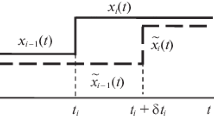Abstract
We consider the problem of average optimal control for a linear hybrid system whose continuous motion alternates with discrete changes (switchings) that change the state space. The initial system state is random. The control quality is characterized by the mean value of a quadratic functional. Switching times and their number are not known in advance. They are determined by minimizing the functional. For the problem under consideration, the classical separation principle does not hold. We prove the so-called conditional separation principle. We also show sample applications of conditional and classical separation principles.
Similar content being viewed by others
References
Ovsyannikov, D. A. Matematicheskie metody upravleniya puchkami (Mathematical Methods for Bundle Control). (Leningr. Gos. Univ, Leningrad, 1980).
Kurzhanskii, A. B. Upravlenie i nablyudenie v usloviyakh neopredelennosti (Control and Observation under Uncertainty). (Nauka, Moscow, 1977).
Bortakovskii, A. S. Optimal and Suboptimal Controls for Bundles of Trajectories for Deterministic Continuous-Discrete Systems. Izv. Ross. Akad. Nauk, Teor. Sist. Upravlen. no. 1, 18–33 (2009).
Bortakovskii, A. S. & Nemychenkov, G. I. Average Optimal Control for Deterministic Switching Systems under Discrete Imprecise Observations. Izv. Ross. Akad. Nauk, Teor. Sist. Upravlen. no. 1, 52–77 (2019).
Bortakovskii, A.S.The Separation Theorem in Control Problems for Bundles of Trajectories of Deterministic Linear Switching Systems, Izv. Ross. Akad. Nauk, Teor. Sist. Upravlen., 2020, no. 2, pp. 37–63.
Velichenko, V. V. Optimal Control of Composite Systems. Dokl. Akad. Nauk SSSR 176(no. 4), 754–756 (1967).
Medvedev, V. A. & Rozova, V. N. Optimal Control of Incremental Systems, Autom. Remote Control 33(no. 3), 359–366 (1972).
Boltyanskii, V. G. Optimization Problem with a Change of the Phase Space. Differ. Uravn. 19(no. 3), 518–521 (1983).
Gurman, V. I. Printsip rasshireniya v zadachakh upravleniya (The Extension Principle in Control Problems). (Nauka, Moscow, 1985).
Emel’yanov, S. V., Utkin, V. I. & Taran, V. A. et al. Teoriya sistem s peremennoi strukturoi (Theory of Systems with Variable Structure). (Nauka, Moscow, 1970).
Kirillov, A. N. Dynamic Systems with Variable Structure and Dimension. Izv. Vyssh. Uchebn. Zaved., Ser. Priborostroenie 52(no. 3), 23–28 (2009).
Sussmann, H.J.A Maximum Principle for Hybrid Optimal Control Problems, Proc. 38th IEEE Conf. on Decision and Control, Phoenix, 1999.
Dmitruk, A. V. & Kaganovich, A. M. The Hybrid Maximum Principle is a Consequence of Pontryagin Maximum Principle. Syst. Control Lett. 57, 964–970 (2008).
Miller, B. M. & Rubinovich, E. Ya Optimizatsiya dinamicheskikh sistem s impulasnymi upravleniyami (Optimization of Dynamical Systems with Impulse Controls). (Nauka, Moscow, 2005).
Bortakovskii, A. S. Synthesis of Optimal Control Systems with a Change in the Models of Motion. Izv. Ross. Akad. Nauk, Teor. Sist. Upravlen. no. 4, 57–74 (2018).
Bortakovskii, A. S. Sufficient Optimality Conditions for Hybrid Systems of Variable Dimension. Tr. MIAN 308(no. 2), 88–100 (2020).
Bortakovskii, A. S. & Uryupin, I. V. Minimizing the Number of Switchings in Optimal Continuous-Discrete Controllable Processes. Izv. Ross. Akad. Nauk, Teor. Sist. Upravlen. no. 4, 29–46 (2019).
Letov, A. M. Dinamika poleta i upravlenie (Flight Dynamics and Control). (Nauka, Moscow, 1973).
Wonham, W. M. On the Separation Theorem of Stochastic Control. SIAM J. Control 6, 312–326 (1968).
Lee, E. B. & Markus, L. Foundations of Optimal Control Theory. (Wiley, New York, 1967). Translated under the title Osnovy teorii optimal’nogo upravleniya, Moscow: Nauka, 1972.
Ovsyannikov, D. A. Modelirovanie i optimizatsiya dinamiki puchkov zaryazhennykh chastits (Modeling and Optimization of the Dynamics of Bundles of Charged Particles). (Leningr. Gos. Univ., Leningrad, 1990).
Bellman, R. Dynamic Programming. (Princeton Univ. Press, Princeton, 1957). Translated under the title Dinamicheskoe programmirovanie, Moscow: Inostrannaya Literatura, 1960.
Author information
Authors and Affiliations
Corresponding author
Rights and permissions
About this article
Cite this article
Bortakovskii, A. Separation Theorem for Average Optimal Control for Hybrid Systems of Variable Dimension. Autom Remote Control 81, 1974–1993 (2020). https://doi.org/10.1134/S000511792011003X
Received:
Revised:
Accepted:
Published:
Issue Date:
DOI: https://doi.org/10.1134/S000511792011003X




